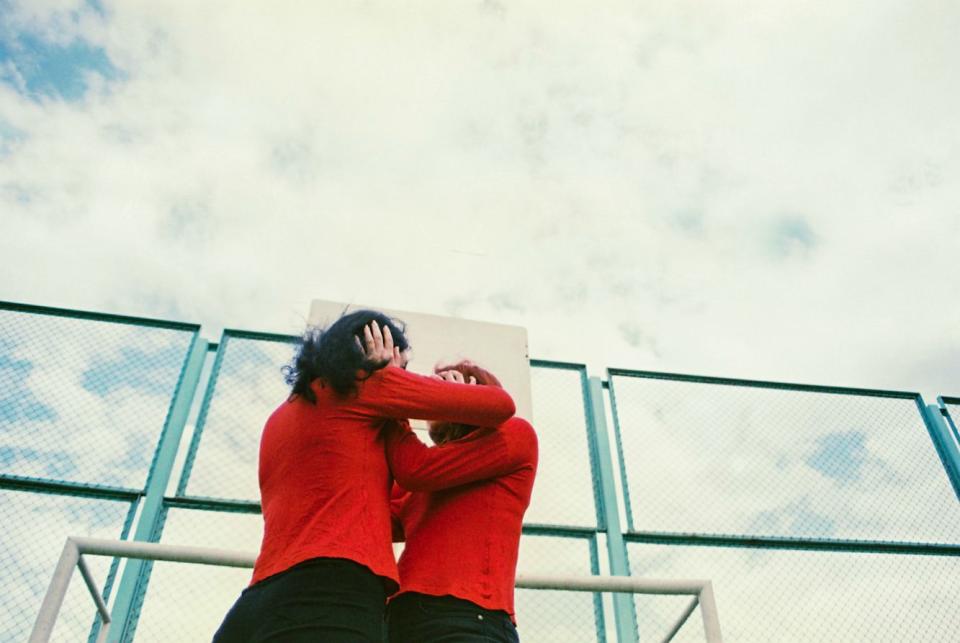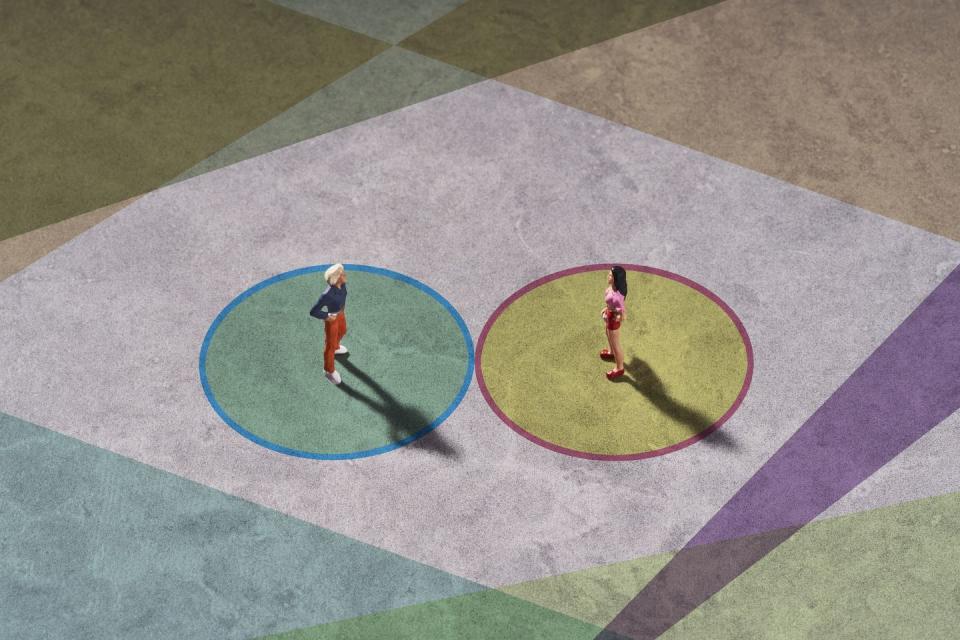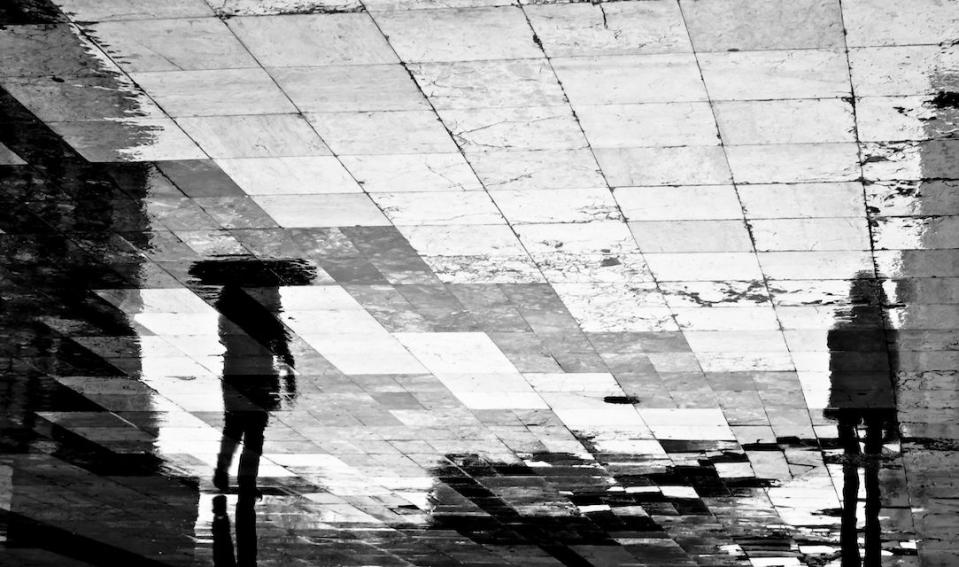Lifting Lockdown Restrictions: Welcome To The Great Friendship Fallout

Jessa was so excited about her garden party, she took the day off work to prepare. She’d spent £350 on a Habitat beach bar gazebo and stocked it with spirits and mixers for cocktails. She’d laid picnic rugs and cushions on the artificial turf, hoping for a ‘chilled Moroccan soirée vibe’. Fairy lights bedecked the garden fence and she had lanterns hanging from trees. On the menu for her five best friends, all in their early 30s, was an elaborate meze followed by an Ottolenghi tagine. She’d had to scour local supermarkets for rose harissa and each of the small dishes had taken hours to make.
This was the friends’ first reunion since last summer when, for a blissful couple of months between lockdowns, Brighton was open and buzzing and they’d ‘eaten out to help out’ together at least three times a week. Over the past year, they’d met for walks by the beach in pairs, and occasionally risked a fine by sitting on a park bench with a coffee, but they hadn’t had the enthusiasm to exchange much more than pleasantries. They certainly hadn’t had any fun, laughs or anything close to ‘a good old deep and meaningful catch-up,’ says Jessa. By 6pm on the unseasonably warm April evening, she was dressed in a jumpsuit and new Zara heels, waiting by the door to welcome her guests.
‘It was an absolute disaster,’ she tells me a few weeks later. ‘When they all finally left, I just lay with a blanket around me on the lawn, sobbing. I couldn’t believe what had happened.’
What had happened was something that many of us are experiencing as we reconnect with friends in social settings after such a prolonged absence: arguments, anger, misunderstandings and explosive conversations.

Jessa’s evening took a turn when, after three Aperol Spritzes, her friend Alice declared that coverage of Prince Philip’s death had been too much and she was ‘annoyed she couldn’t watch what she wanted as every channel showed rolling news’. The five others rounded on her. Alice defended her stance – then the topic turned to Meghan and Harry. ‘That’s when it got really bad,’ says Jessa. ‘Alice was shouting that “[Meghan] should have known what she was getting into.” Me and the others were like, “No, she should have been protected.”’ Alice started to cry, feeling she was being ganged up on, then, ‘My mate Tash starts crying – she said no one was listening to her. The food went uneaten, and we called it a night by eight. I was devastated.’
Jessa is far from the only one experiencing this kind of cataclysmic friendship fallout. I spoke to Lindsay George, a psychotherapist who specialises in relationships. She told me that during the pandemic women suffered greatly from not being able to regularly see their social circle. ‘We realised we can’t rely on our partners and children to give us what friends have always given us, which is support and escape from the drudgery of daily life. Our identities are a result of our relationships with other people, and friendships are so vital in seeing a part of ourselves reflected back. The loss of those in-person friendships has had a deep effect on our sense of selves. It’s no wonder people are finding it difficult to pick up with friends as if nothing has changed.’
Rebecca, a 32-year-old events planner from Bristol, was surprised by how awkward things were with her tight friendship group when they first got together for a barbecue after eight months apart. ‘Our WhatsApp group had really been keeping me going over lockdown. We’d chat and check in every day. We’d been planning a party in my friend Sophie’s garden for weeks – we were so excited. But it was weird, when we were finally in the same space, it was like we’d forgotten how to be. We were all talking over each other and gushing about how good it was to see each other. After the initial hysteria, it was as if no one knew what to say.’
Ann Friedman and Aminatou Sow are hosts of the Call Your Girlfriend podcast and authors of a new book Big Friendship, which explores their own relationship and what it really takes to stay close for the long-haul. When I spoke to them on Zoom from their homes in LA and New York, Sow confessed that she’s struggling with social re-entry: ‘When I’ve seen more than one person at a time recently, I have a sense of being hungover the next day, even though I haven’t been drinking alcohol. It’s an emotional tiredness, because we [are out of the habit of socialising] and there are so many emotions. It’s a process of relearning and recalibrating. Even something as trivial as discussing a lunch order with someone you haven’t talked to for months is very strange.’
So what’s going on? It’s not as though these people are individuals we don’t know, or like, or haven’t spoken to at all for months. Why can’t we just pick up where we left off?
Sow says that what is missing right now is a real understanding that we have been through a traumatic experience for the past 18 months. Focusing on individual ‘transgressions’, or the micro of a relationship, is a deflection from this collective trauma. The pettiness of life drama is easier to focus on than what she calls ‘the mindf*ck of “Have we really been living like this for so long?”’

Lindsay George agrees. ‘I’m noticing there’s a lot of resentment. People are annoyed their friends “bubbled up” with someone else over them, or spent hours talking to a mutual friend and not including them. But rather than addressing these issues at the time, they have festered. Now we’re meeting up again, they are rising to the surface and causing arguments.’
Friedman emphasises the need to manage expectations around our social reunions because of this. ‘No two people in a friendship are having the exact same experience of that friendship. Expectations are a projection of what you in your head hope for or want for in your relationship,’ she says. ‘Think about saying to your friend before you meet, “This is how I’m really hoping it feels when we get together.” We’re all in different places on the joyful reunion versus anxiety spectrum. Sometimes it can feel really freeing to articulate that you’re not ready for a big party or that you have really high expectations for it.’
In her mind, Rebecca had built up meeting her friends into something hugely significant, and was hoping that the party would continue into the early hours. Instead, Sophie had invited her new boyfriend along and went up to bed with him at 11pm, leaving the others to carry on the party without them. ‘I was really pissed off,’ Rebecca tells me. ‘We hadn’t seen each other for so long. Then when we finally did – after all the messages about how amazing it was going to be – she couldn’t keep her eyes off her new man and chose to go and sleep with him rather than hang out with us. I was so angry. I’m not normally an argumentative person but I stayed over and the next morning I sat at the breakfast table fuming. I was desperate to tell her how I felt.’
The conversation turned heated, Sophie was defensive, voices were raised. ‘At any other time, I would have let it go. But maybe it’s because I’ve changed over this past year, or that there’s this insane pressure on social interactions now that we’re allowed them. Whatever the reason, we had a massive row for the first time ever. I think it’s going to take a while for things to feel normal between us again’.
Lindsay George is all for a bit of healthy conflict. ‘I encourage it,’ she tells me. ‘It can be a positive thing. The whole situation with conflict is that it presents a challenge in relation to change. Change is about evolving into something different. And conflict often arises because our opinions have changed or something has resonated with us, forcing us to think differently. We need to be mindful of how the pandemic has changed our friends as much as ourselves.’

The truth is, that although it’s felt like Groundhog Day at times, we have all been on big individual journeys since March 2020. Some of us have experienced mental health issues, grief and illness, others have survived largely unscathed – even thrived – and that can mean we are meeting our friends at a different point in our lives to the one where we left them. It’s not a given that we will still connect as we once did or, indeed, still want to be friends.
‘The pandemic has confronted me with my own lack of things and my sense of who I am in the world,’ Sow tells me. ‘Let’s consider the reality of the pandemic’s emotional scarcity, on top of the yawning inequality of it – some did better than others. When you contextualise this within friendships, we aren’t adept at navigating big differences. The pandemic has really blown them out of proportion.’
Olive, 32, probably had one of the toughest times out of all of her friends. ‘I had a few very vulnerable family members that I needed to look after when the pandemic was at its worst,’ she says. ‘I was very anxious about them and needed to take time off work to care for them. I moved back in with my mum and took all of the rules extremely seriously as I wanted to stay safe. Meanwhile, my friends were having secret parties and weren’t paying attention to the restrictions at all. We’re all going for dinner this week and I know there will be so much unsaid. I will really have to bite my tongue.’
And the pandemic is not the only thing we’ve been dealing with for the past 18 months. Olive talks about how the murders of George Floyd and Daunte Wright – among countless others – left her feeling emotionally exhausted. But she’s not convinced she has the energy to really ‘go there’ with her white friends. ‘If we start talking about Black Lives Matter at dinner, I can’t say how I’m going to react because so much has been unsaid for so long. I feel like our reunion isn’t just going be this happy, light, breezy thing that we all expect it to be, because we’ve actually got a whole year of life to catch up on. All this huge, emotional stuff has happened for me that I’ve not talked to them about. It’s too awkward over WhatsApp or Zoom calls, but now it’s almost like, if I do bring it up, it’ll turn what’s supposed to be a fun night out into something really intense.’
In our year and a half of various levels of isolation, we have experienced uprisings, activism and issues including white privilege, male violence, Asian hate and transgender discrimination, not to mention the politics of lockdowns and a battle against conspiracy theories, none of which have we had the opportunity to discuss in an easygoing, everyday context at work, around the dinner table or at the pub with friends. Until now. Our opinions have been simmering like a pot left on a low heat for so long – now our freedom to socialise has turned up the burner, blown off the lid and emotions are boiling over.
‘There’s a kind of sonar within friendship,’ Friedman says. ‘It’s how you understand yourself in relation to the other person. But it also helps you locate yourself in the world – being in contrast to, and in community with, your friends. It is so important to be able to get a sense of each other in person. Because there is so much to our relationships that cannot be typed out in a text message.’ She agrees that we’re finding ourselves in different positions related to each other when we meet up. ‘Conflict is inevitable because we’ve had this fixed idea of who our friends are and what our relationship is, that maybe we haven’t checked in with them or held up that idea against reality for many months.’

My friend Michael has muted a WhatsApp group with his closest school friends after it got what he describes as ‘a bit anti-woke, Laurence Fox-y’. He’s been making excuses not to join them since they could get together in person again. ‘There’s no way these are going to be nice, relaxing evenings,’ he explains. ‘I’ve always thought of my friends as like me – pretty evolved, feminist, intelligent and empathetic straight men. But, over lockdown, messages took a dark and unkind turn under the guise of “banter”. I wasn’t comfortable with it. I can only imagine what the actual chat is like once the boys have had a few drinks.’
Friedman says that ‘[during the pandemic] you were really forced to choose who your people were. And some of that was just who was around, and logistics, and how life unfolded. Then there’s the fact that if you don’t go through a big important transition with people, it’s hard to be intact on the other side of that, whether that’s switching schools, or going to college, or this weird war with disease that we’ve lived through.’
Lindsay George has some advice for handling conflict: ‘Try dealing with the feeling in the moment that you’re feeling it, then move on. Once it’s happened, it gets more and more frustrating and difficult to deal with. Sometimes that’s not possible, because there may be one person who takes three days, not three minutes to recover. And it’s important to recognise that people have a different level of processing time. So you might feel that you want to sort this out now, but your friend might not be ready. Respect that.’
I ask Friedman and Sow if friendships can survive these kinds of fractious social reunions. Friedman says the short answer is yes, but it’s about asking if it’s a friendship worth saving. ‘If this relationship was already hanging by a thread, or not so emotionally central in your life, saying something that’s not aligned with your values or having a really difficult interaction and not handling it can be sackable offences. But if you’re talking about a friendship where you have meant a lot to each other over the years, it warrants a conversation along the lines of, “Listen, this is what I hoped or expected. This is what I felt after we actually hung out.” And, if you can, “This is what I hope happens next.”’
As we reconnect socially, it’s important to accept that it may take time to find our rhythm with friends again. Maybe we should set our expectations for the event – whether that’s having meaningful conversations where we feel truly understood or having a huge hedonistic blowout and the kind of capslock FUN that we used to – down from 10 to something more achievable. Sow suggests that we approach interactions with a sense of curiosity, care and empathy. ‘Asking, “How has this time been for you? How has it been hard? And what about it has been not as hard as you thought?” can go a long way.’
So, before you book that villa in Cornwall with two other families, or start planning weekly big dinners out and long-awaited club nights, or spend £350 on a beach bar gazebo for a garden party, it might be wise to try out who you are now with your friends on a smaller scale and get any conflict and resolution out of the way before bigger events. We learnt who and what we really missed during those dark, unsociable months. Let’s not forget it in the frenzy of highly charged summer FOMO.
This article appears in the August issue of ELLE UK, out on newstands on July 8, 2021.
You Might Also Like


